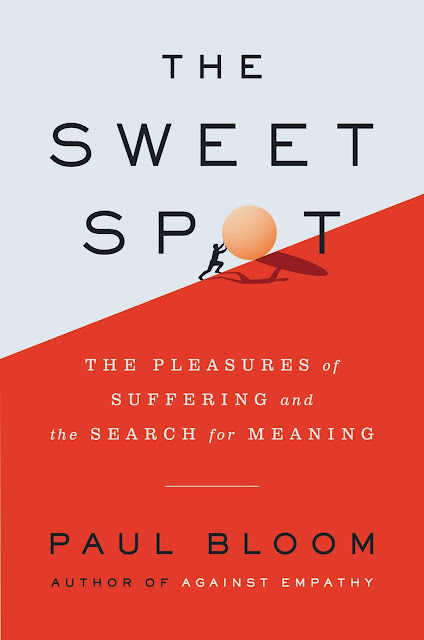The Sweet Spot by Paul Bloom
The Pleasures of Suffering and the Search for Meaning
Paul Bloom is Professor of Psychology at University of Toronto, and the Brooks and Suzanne Ragen Professor Emeritus of Psychology at Yale University. His research explores the psychology of morality, identity, and pleasure. He is the author or editor of eight books, including Just Babies, How Pleasure Works, Descartes’ Baby, and, most recently, Against Empathy.
“Under the right circumstances and in the right doses, physical and emotional pain, difficulty and failure and loss, are exactly what we are looking for.”
THE SWEET SPOT
Why do we so often seek out physical pain and emotional turmoil? We go to movies that make us cry, or scream, or gag. We poke at sores, eat spicy foods, immerse ourselves in hot baths, run marathons. Some of us even seek out pain and humiliation in sexual role-play. Where do these seemingly perverse appetites come from?
Drawing on groundbreaking findings from psychology and brain science, The Sweet Spot shows how the right kind of suffering sets the stage for enhanced pleasure.
But suffering plays a deeper role as well. We are not natural hedonists—a good life involves more than pleasure. People seek lives of meaning and significance; we aspire to rich relationships and satisfying pursuits, and this requires some amount of struggle, anxiety, and loss. Brilliantly argued, witty, and humane, Paul Bloom shows how a life without chosen suffering would be empty—and worse than that, boring.
In the opening pages of his novel, Paul Bloom states that “pain can distract us from our anxieties, and even help us transcend the self. Choosing to suffer can serve social goals; it can display how tough we are or, conversely, can serve as a cry for help. Unpleasant emotions such as fear and sadness are part of play and fantasy and can provide certain moral satisfactions. And effort and struggle and difficulty can, in the right contexts, lead to the joys of mastery and flow.”
Reading Bloom's opening statements in his intro, I kind of wanted to disagree with him, and tell him all the reasons I thought he was wrong. Why would one choose to suffer?
His words were so thought-provoking, however, and I was compelled to read on.
Bloom then moves onto what makes humans happy. When talking about self-help gurus and motivational speakers who promise to have all the tools to make us happy, Bloom says, “much of what we are told about happiness and the good life should not be trusted.” As someone who, like Paul, has watched a lot of TedTalk keynotes on happiness, I couldn't agree more.
The book goes on to explore in depth two types of chosen pain and suffering—for pleasure and for meaning—which differ in many ways. Examples of pain for pleasure that Bloom gives are of a having a hot bath or eating a spicy curry, activities that are actively pursued. The other kind of pain, for meaning, refers to things like climbing a mountain or having children, things that are “effortful and unpleasant. But they are part of a life well lived.”
While looking at these two chosen forms of pain and suffering, and the examples given, it's easy to see how we get pleasure from them. A scolding hot bath at the end of a day spent in the freezing cold, or the feeling of reaching the top of a mountain despite all the pain and exhaustion it took to get there, can bring great pleasure.
There's a fascinating chapter in the book called Benign Masochism, in which Bloom talks about the different kinds of masochism, such as moral masochism, in which someone seeks out suffering to relieve guilt, and benign masochism which refers to certain types of voluntary pain and suffering.
This chapter also touches on self harm, referred to as NSSI (non-suicidal self-injury), which is a type of chosen pain. Bloom states, “It is not a pleasurable choice. People self-injure when experiencing feelings of self-hatred, often in response to some traumatic event.” He goes on to talk about the reasons for self injury, and how it's often motivated by a desire for self-punishment.
Other chapters in the book talk in depth about struggle, meaningful lives and pursuits, and sacrifice.
Overall, The Sweet Spot made for a fascinating read. I learned about the different kinds of pain, and what we gain from them. I also learned a lot about happiness, satisfaction, and pleasure. Reading about pain and pleasure side by side was fascinating. I liked that Paul also included personal stories into the book, making it more of an engaging and at times, humourous read.
To conclude, The Sweet Spot is well researched, wildly interesting, and fantastically written.
 |
| Courtesy of Harper Collins |
